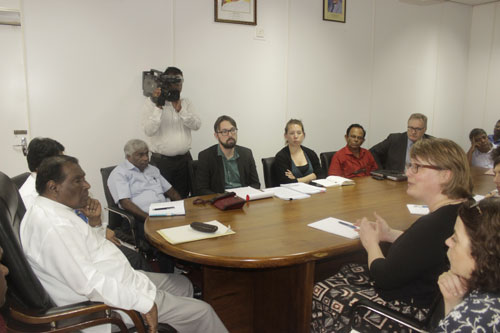European Union to decide in May on SL’s GSP+ request
View(s):
The EU delegation at a meeting with the Labour Minister at which local trade union representatives were also present
A visiting European Union (EU) delegation examining trade union and workers’ views on Sri Lanka’s application for a resumption of GSP+ concessions has raised many concerns focussed on guarantees given by the government earlier and stating firmly that trade benefits should acrue to workers.
After more than 10 meetings with workers and unions, the delegation had – according to EU Parliamentarian Lola Sánchez Caldentey – concluded that “if the European Union consumers knew the abusive conditions under which the women do the cloth that they buy, they would be ashamed.”
Another visiting EU Parliamentarian Anne-Marie Mineur was quoted as saying, “the government must ensure that these workers can organise themselves through trade unions, because otherwise they will keep on being exploited”.
These comments and others were released by IndustriALL Sri Lanka Council (an affiliated of the IndustriALL Global Union Federation), which had invited an EU delegation to examine Sri Lanka’s request vis-à-vis labour conditions, labour rights and rights to organise. The delegation was in the country on April 10-12 and met with various stakeholders.
“In 2015 we received with satisfaction the commitment of the Sri Lanka government to put in place legislation to address Human Rights violations. However the implementation of that legislation remains very questionable,” said Ms. Mineur while adding that collective bargaining and the right to strike should be an integral part of the fundamental rights of workers.
Ms. Caldentey noted that, “we are willing to give preferences to Sri Lanka, but only if we are sure that the benefit goes also to the workers” and added: “The European Union shall not grant a special trade status to Sri Lanka if the money coming from this advantage remains only in the pockets of a few business people.”
The main focus of the mission was to evaluate the status of labour rights in the country, which is a main concern for some political groups in the EU.
The media release said the EU will decide next month whether Sri Lanka is duly entitled, or not, to be granted GSP+. This status is a component of the EU policy for developing countries which offers trade incentives to those which implement core international conventions on human and labour rights, sustainable development and good governance.
The two EU parliamentarians with other delegates including representatives of trade union 3F of Denmark, International Transport Workers Federation (ITWF) and Clean Clothes Campaign (CCC) met encountered workers who have been object of labour rights violations, including harassment to trade unions, illegal dismissal of trade union leaders, sexual harassment and labour rights violations within the Free Trade Zones, the release said.
The delegates also expressed their concerns about the extensive use of manpower agencies for co-working arrangements, which have undermined freedom of association and collective bargaining; and on the fact that the judiciary has increasingly been interfering in labour disputes and collective bargaining to the detriment of trade unions.
At a meeting with Labour Minister John Seneviratne, the latter has expressed his commitment to ensure that 50 per cent of the benefits of GSP+ will be for the workers.
“We obviously welcome this engagement, but we still don’t know how the government will deliver this promise; we will therefore be closely following its implementation. From our perspective, the first step to make sure that the benefits go to the workers is to make sure that they get fair wages, have the effective right to organise and bargain collectively. Signing a convention is just the beginning. The real challenge is to implement it; to ensure that workers not only have the theoretical right to organise, but also that, in reality, there is no harassment towards trade unions by the employers,” the statement quoted the delegates as saying.


